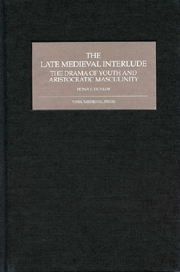Book contents
- Frontmatter
- Contents
- Dedication
- Acknowledgements
- List of Abbreviations
- Introduction: The interlude as a literary genre
- 1 Defining Youth
- 2 Young Masculinity and Late Medieval Discourses of Youth
- 3 Noble Masculinity in the Interludes
- 4 Interludes and the Politics of Youth
- Conclusion
- Bibliography
- Index
- YORK MEDIEVAL PRESS: PUBLICATIONS
4 - Interludes and the Politics of Youth
Published online by Cambridge University Press: 05 February 2013
- Frontmatter
- Contents
- Dedication
- Acknowledgements
- List of Abbreviations
- Introduction: The interlude as a literary genre
- 1 Defining Youth
- 2 Young Masculinity and Late Medieval Discourses of Youth
- 3 Noble Masculinity in the Interludes
- 4 Interludes and the Politics of Youth
- Conclusion
- Bibliography
- Index
- YORK MEDIEVAL PRESS: PUBLICATIONS
Summary
The anxiety expressed in these interlude texts about young masculinity is an anxiety about political power, since noble masculinity is predicated on an ability to rule and govern others. The lack of moral self-discipline displayed by many of the young male characters is symptomatic of a wider political incompetence, further illustrated in the interludes by the failure of young men to govern their own household servants, and to evaluate counsel and counsellors effectively. The question of how to become an adult nobleman is therefore closely bound up with questions of good and bad government. The figures of young noblemen are a convenient means for the texts to introduce a political discussion, which draws on familiar assumptions in late medieval political texts.
The connection between noble masculinity and the ability to govern in these plays is to be expected, given that the later medieval nobility constituted a ruling class. Many noblemen were active at the political centre through their roles as members of parliament and privy councillors. Others were appointed to offices at the disposition of the king which conferred power and status, since the holders were deputized to act on behalf of the king. Nobles exercised political authority at a local level by serving on commissions of the peace in their counties, as well as contributing to the maintenance of good order through their households. For many noblemen, to govern was to be noble, and the interludes reflect this by making the government of others the defining test of noble masculinity.
- Type
- Chapter
- Information
- The Late Medieval InterludeThe Drama of Youth and Aristocratic Masculinity, pp. 90 - 121Publisher: Boydell & BrewerPrint publication year: 2007



